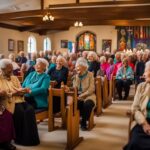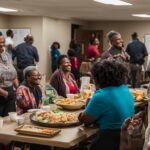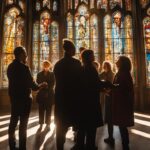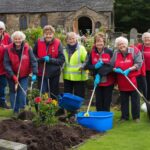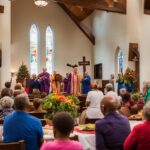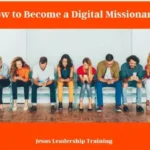As seniors navigate through the challenges and changes of midlife, many of them seek support and encouragement from their local churches. However, it is often observed that congregations focus more on families with young children, leaving older members feeling neglected or marginalized. This trend has led to a significant number of older believers quietly slipping away from their churches. In order to address this issue and support the spiritual journey of seniors, it is crucial for churches to offer a variety of religious activities tailored specifically for this age group.
Key Takeaways:
- Seniors face unique challenges and changes in their faith journey and often feel neglected or marginalized by their churches.
- Churches should understand and address the spiritual and emotional needs of older believers to prevent them from drifting away.
- Creating supportive communities and engaging seniors in meaningful activities can re-engage and strengthen their faith.
- Encouraging seniors to serve the community outside the church walls can provide purpose and meaning in their spiritual journey.
- Providing spiritual direction and guidance can support personal growth and deeper connections with their faith.
Understanding the Spiritual and Emotional Needs of Seniors
Seniors embark on a unique faith journey that comes with its own set of challenges and changes. This stage of life can be marked by ministry burnout, unhealed wounds from congregational politics, health issues, financial worries, and the responsibilities of being part of the sandwich generation. Adding to these difficulties, many seniors also feel neglected or marginalized by their local churches. It is imperative for churches to acknowledge and address the specific spiritual and emotional needs of older believers to prevent them from drifting away.
Seniors need a safe and supportive environment where they can connect with their faith, find healing, and receive guidance. Recognizing their experiences and struggles is crucial in creating meaningful senior spirituality programs, elderly religious activities, and religious services specifically designed for older adults. By catering to their unique needs, churches can revitalize and empower seniors, fostering a sense of belonging and promoting spiritual growth.
Providing Personalized Support
One aspect of understanding the spiritual and emotional needs of seniors is offering personalized support. This can include providing opportunities for one-on-one spiritual guidance or offering group sessions where seniors can share their joys, challenges, and reflections. By creating a space for sharing and supporting one another, churches can foster a sense of community, encouraging seniors to deepen their faith connections.
Addressing Life Transitions
Seniors often face significant life transitions, such as retirement, loss of loved ones, or declining health. Churches can provide support and resources to navigate these changes through workshops, grief counseling, or support groups. Helping seniors find meaning and purpose in these transitions can bring new perspectives and renewed faith.
“Understanding the spiritual and emotional needs of seniors is the foundation for developing impactful religious activities and services.”
Creating Intergenerational Connections
Intergenerational interactions have immense value, especially for older adults. By fostering connections between seniors and younger church members, churches can create a sense of belonging and purpose for older believers. Activities like mentoring programs, intergenerational service projects, and joint worship services can bridge the generation gap, fostering mutual understanding and nurturing strong bonds of faith.
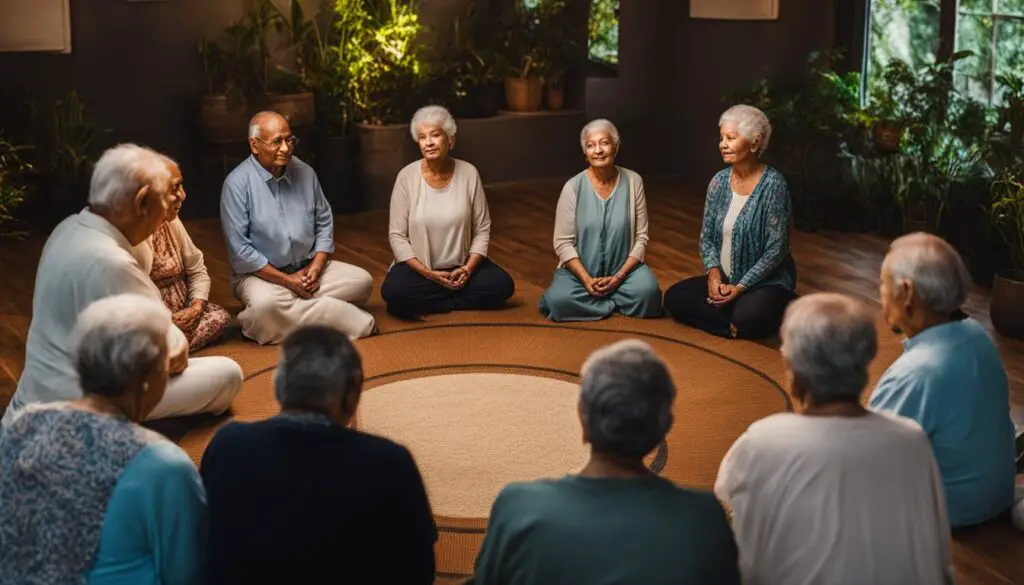
The image above represents the power of senior spirituality programs and elderly religious activities in meeting the unique needs of older adults, building a supportive and thriving community.
Fostering Emotional Well-being
Emotional well-being is crucial for seniors’ overall spiritual journey. Churches can offer workshops or support groups that help older believers navigate emotional challenges like loneliness, anxiety, or depression. By integrating emotional well-being into religious activities, churches can create a holistic approach to senior spiritual care.
Empowering Seniors
Lastly, empowering seniors to actively participate in shaping their spiritual journeys is essential. Churches can provide opportunities for older adults to lead and contribute as mentors, teachers, or program coordinators. By recognizing their wisdom and strengths, churches can cultivate a sense of purpose and fulfillment, ensuring seniors feel valued and engaged.
Understanding the spiritual and emotional needs of seniors is a crucial step in nurturing their faith and promoting their overall well-being. By developing tailored senior spirituality programs, offering elderly religious activities, and providing religious services specifically designed for older adults, churches can create an inclusive and supportive environment that enriches the lives of seniors as they continue their faith journey.
Creating Supportive Communities for Seniors
As seniors continue their spiritual journey, it is essential for churches to create supportive communities that cater specifically to their needs. These communities provide a sense of belonging and fellowship, offering older believers the opportunity to connect with like-minded individuals. By engaging in activities that promote intergenerational connections and meaningful conversations, seniors can strengthen their faith and find a renewed sense of purpose.
One way churches can foster these supportive communities is by organizing religious groups for seniors. These groups provide a platform for older believers to come together, share their experiences, and support one another. Through book groups, conversation groups, movie-watching sessions, and discussion groups, seniors can engage in enriching activities that stimulate their minds and hearts.
These interactions not only provide a space for seniors to express their thoughts and beliefs but also encourage intergenerational connections. Opening up the opportunity for younger members to participate in these activities can create a sense of mutual respect and understanding between different age groups within the church.
By embracing senior church activities, churches can create an inclusive environment where seniors feel valued, heard, and supported. These activities can range from Bible study sessions tailored to the needs of older believers to music and dance classes that tap into their creative expression.
“The true measure of any society can be found in how it treats its most vulnerable members.” – Mahatma Gandhi
When seniors find a place where they can actively engage in their faith, connect with others, and contribute their wisdom, their spiritual journey becomes more fulfilling and rewarding. Creating a supportive community for seniors within the church is not only a way to nurture their faith but also a reflection of the church’s commitment to its members.
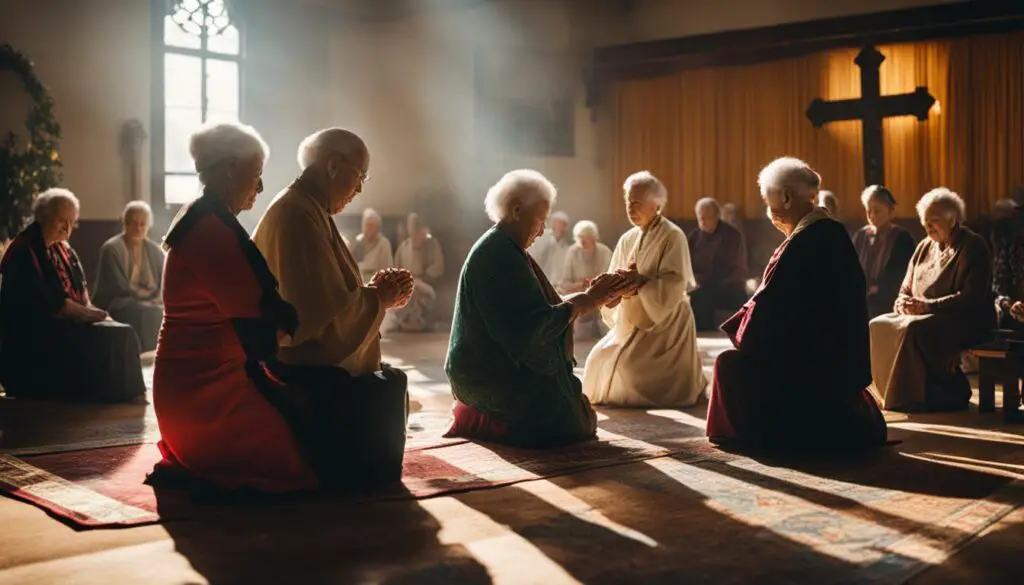
Serving the Community Outside the Church
While religious activities within the church are essential for seniors, it is equally important to encourage them to extend their service beyond the church walls. By engaging in social outreach programs and partnering with local ministries, older adults can make a significant impact on their community. Serving others not only provides seniors with a sense of purpose and fulfillment but also allows them to embody the teachings of their faith.
One way religious groups for seniors can serve the community is by organizing food drives to support local food banks. This not only helps address the issue of food insecurity but also brings together individuals from different generations and backgrounds, fostering unity and compassion.
“Service to others is the rent you pay for your room here on Earth.” – Muhammad Ali
Another meaningful way seniors can contribute is by participating in volunteer programs that focus on helping vulnerable populations, such as homeless shelters, nursing homes, or after-school programs. By offering their time and skills, older adults can provide companionship, mentorship, and support to those in need.
Furthermore, seniors can collaborate with local community organizations on projects that promote environmental sustainability or advocate for social justice. By standing up for the marginalized and advocating for positive change, religious groups for seniors can make a lasting impact on society.
Impact of Senior Community Service Programs
| Benefits for Seniors | Benefits for the Community |
|---|---|
| Enhanced sense of purpose and fulfillment | Addressing societal needs and improving quality of life |
| Fostering intergenerational connections and relationships | Building a stronger and more caring community |
| Utilizing skills and knowledge acquired over a lifetime | Providing valuable resources and expertise |
| Reduced feelings of isolation and loneliness | Creating a sense of belonging and unity |
By involving seniors in service activities outside of the church, religious groups can tap into their wisdom, experience, and passion to make a real difference in the lives of others. This not only strengthens the bonds within the congregation but also allows the love and compassion of their faith to extend far beyond the walls of the church.
Providing Spiritual Direction and Guidance
For many seniors, the journey of faith in the later years can feel uncertain and challenging. That’s why trained spiritual directors can play a crucial role in providing the necessary guidance and support. By offering individual or group experiences, these spiritual directors empower older adults to explore their spirituality, find meaning, and deepen their connection with their faith.
“The role of a spiritual director is to accompany individuals on their spiritual path, helping them navigate the challenges and uncertainties of their faith journey,” says Reverend Sarah Thompson, a spiritual director at Grace Community Church.
While spiritual direction may be a new concept for some conservative churches, it offers immense value for older members seeking personal growth and a deeper understanding of their relationship with God. Through compassionate and non-judgmental conversations, spiritual directors provide a safe space for seniors to explore their spiritual questions, seek guidance, and cultivate a more profound sense of their spiritual purpose.
In addition to individual spiritual direction, group experiences can also be immensely beneficial. By participating in group spiritual direction, seniors have the opportunity to connect with others who may share similar experiences and challenges. These group settings foster a sense of community, allowing individuals to learn from one another, offer mutual support, and foster spiritual growth.
Benefits of Spiritual Direction for Seniors
Spiritual direction offers a range of benefits for older adults, enabling them to:
- Gain clarity and understanding in their spiritual journey
- Explore and deepen their relationship with God
- Find comfort and solace in times of grief or loss
- Develop a stronger sense of purpose and meaning
- Address questions and doubts surrounding faith
- Experience healing and inner transformation
Through the guidance of trained spiritual directors, seniors can navigate the complexities of their spiritual lives, find solace in their faith, and discover new depths of spiritual growth and fulfillment.
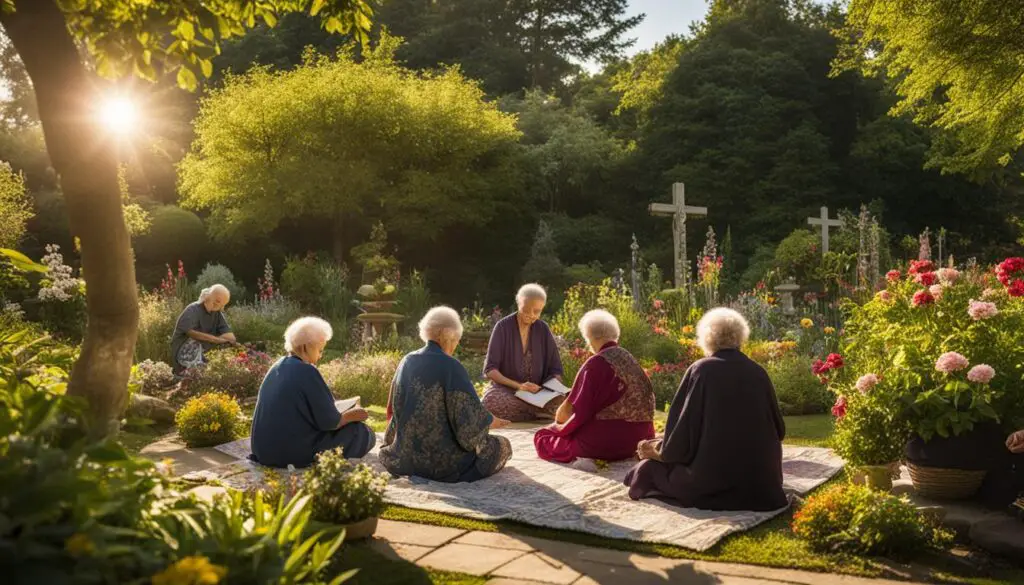
Embracing Second-Half-of-Life Faith
As seniors journey through the second half of life, their spiritual needs and challenges evolve. To support them in this phase, churches can develop instructional programs specifically tailored to address the unique experiences of older adults. These programs can cover various topics that are central to their spiritual growth and well-being.
“In the end, it’s not the years in your life that count. It’s the life in your years.” – Abraham Lincoln
Topics Covered in Second-Half-of-Life Faith Programs
- Vocation and Self-Knowledge: Emphasizing the importance of discovering one’s purpose and identity in the second half of life can help seniors find renewed meaning and direction. Workshops and discussions can explore new opportunities for utilizing their skills and passions to make a positive impact in their communities.
- Classic Spiritual Disciplines: Introducing seniors to traditional spiritual practices such as meditation, prayer, journaling, and contemplation can deepen their connection with God and provide them with spiritual nourishment during this stage of life. These practices can also foster self-reflection and personal growth.
- End-of-Life Planning: Addressing end-of-life considerations, such as funeral planning, legacy building, and embracing mortality, can help seniors navigate this aspect of their faith journey with grace and intention. Workshops and resources can be provided to guide them through these important preparations.
By offering these specified resources and support, churches can empower seniors on their spiritual journey in the second half of life, fostering a sense of purpose, connection, and fulfillment.
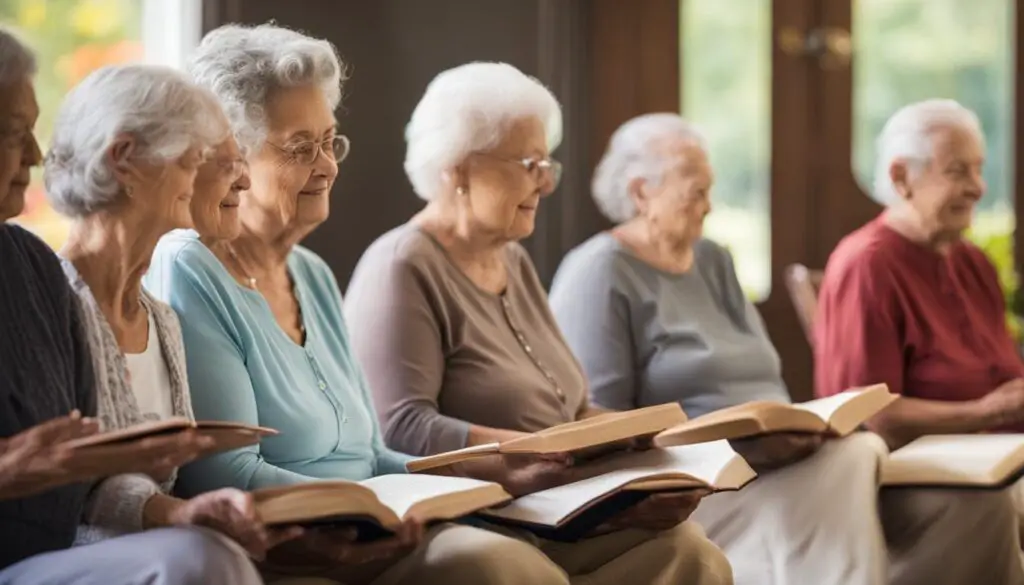
| Benefits of Second-Half-of-Life Faith Programs | Examples |
|---|---|
| 1. Renewed Sense of Purpose | Exploring new vocations, volunteering opportunities, or mentoring younger generations |
| 2. Deeper Spiritual Connection | Engaging in contemplative practices, participating in spiritual retreats or pilgrimages |
| 3. Enhanced Emotional Well-being | Developing strategies to cope with grief and loss, finding support in community |
| 4. Intergenerational Connections | Mentoring younger members, participating in intergenerational events, and initiatives |
| 5. Sense of Legacy | Planning end-of-life arrangements, leaving a lasting impact through community service |
Incorporating Music and Art in Worship
Music and art have a profound impact on the spiritual well-being of seniors. The powerful combination of melodies, lyrics, and visual expressions can evoke deep emotions, create a sense of comfort, and provide a connection with one’s faith. Churches can enhance the worship experience for older believers by incorporating sacred music, hymns, and art into their services.
Through the timeless beauty of hymns and sacred music, churches can transport older adults to a place of solace and reflection. The familiar tunes and lyrics can evoke cherished memories, inspire gratitude, and bring a renewed sense of awe and wonder. Whether it’s the soothing melody of “Amazing Grace” or the uplifting rhythm of “How Great Thou Art,” these hymns have the power to uplift the spirit and strengthen the faith of seniors.
Additionally, incorporating art into worship can enhance the sensory experience and create a visually stimulating atmosphere. Churches can display religious artwork that depicts biblical stories, symbols of faith, or inspirational scenes. These visual representations can serve as a source of contemplation, providing older adults with a visual connection to their beliefs.
Artistic expressions such as paintings, sculptures, or stained glass windows can create a sacred ambiance, elevating the worship experience for seniors. These visually captivating elements can evoke a sense of reverence, inviting older believers to engage more deeply with their faith and find solace in the presence of God.
In summary, incorporating music and art in worship can be a transformative experience for seniors. By embracing the power of sacred music and visual expressions, churches can create a meaningful and engaging worship environment for older adults. Through melodies that touch the heart and visual representations that inspire the soul, seniors can find spiritual solace and connect more deeply with their faith.
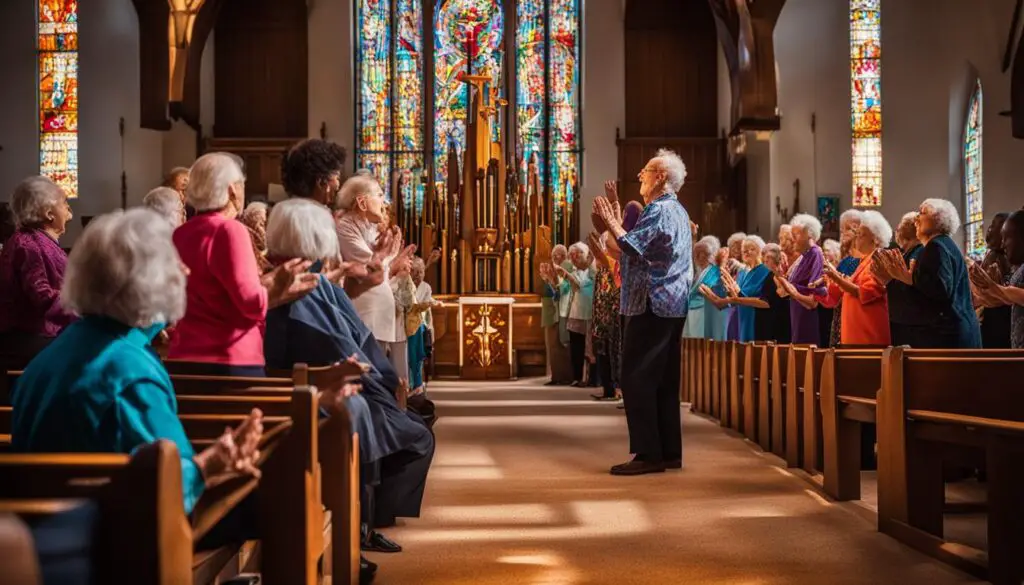
Promoting Interfaith Dialogue and Understanding
In today’s diverse and multicultural society, religious groups for seniors have an incredible opportunity to foster interfaith dialogue and understanding. By promoting connections and interactions among people of different faiths, senior church activities can facilitate mutual respect and appreciation for various religious traditions. This not only enriches the spiritual journeys of older adults but also strengthens the fabric of our communities.
Through organized events and programs, churches can create safe spaces where seniors from different religious backgrounds can come together in a spirit of unity and curiosity. These gatherings provide a platform for sharing beliefs, traditions, and values, fostering meaningful conversations and deepening understanding between individuals from diverse faith communities.
“In embracing interfaith dialogue, we open ourselves to a world of wisdom and understand that our differences can bring us closer together.”
– Reverend Sarah Mitchell
Intergenerational dialogues that involve youth and older adults can be particularly powerful, as they bridge generational gaps and encourage the exchange of wisdom and experiences. These conversations allow seniors to share their knowledge and perspective while offering younger individuals a broader understanding of different religious practices and beliefs.
The Benefits of Interfaith Dialogue for Seniors
- Cultivating empathy: Interfaith dialogue helps seniors develop empathy by fostering an appreciation for the diverse experiences, struggles, and joys of people from different religious backgrounds.
- Broadening perspectives: Engaging with individuals from varied faith traditions expands seniors’ horizons, challenging preconceived notions and broadening their understanding of spirituality.
- Strengthening relationships: Interfaith dialogue fosters strong bonds and relationships among individuals, forging connections that transcend religious boundaries.
- Promoting peace: By promoting understanding and respect, interfaith dialogue contributes to a more harmonious and peaceful society, where different faith communities can coexist with mutual respect and acceptance.
Through the promotion of interfaith dialogue and understanding, religious groups for seniors can create an inclusive space that celebrates the richness of religious diversity and encourages personal growth and unity. By embracing this transformative practice, churches can pave the way for a more compassionate and interconnected world.
Testimonials from Seniors
“Participating in interfaith dialogue has opened my eyes to the beauty and wisdom in different religious traditions. It has deepened my own faith and broadened my perspective on spirituality.”
– Mary Thompson, 72
“I love being part of interfaith events at my church. It’s amazing to see how we can all come together, learn from one another, and appreciate the diversity that exists in our community.”
– William Lee, 68
Conclusion
As we conclude our exploration of religious activities for seniors, it becomes evident that churches have a vital role in nurturing the faith of older believers. By recognizing and addressing their unique spiritual and emotional needs, churches can create a supportive community that guides seniors through the second half of life.
Providing a range of religious activities tailored to the age group of seniors is crucial. By offering engaging programs and services, churches can nurture the faith of older believers and strengthen their sense of belonging. Whether it’s through supportive communities, serving the community outside the church, or providing spiritual direction and guidance, these activities play a key role in empowering seniors on their spiritual journey.
Furthermore, embracing second-half-of-life faith, incorporating music and art in worship, and promoting interfaith dialogue and understanding are all essential components of fully engaging seniors in their faith. These activities create meaningful connections, evoke emotions, and foster mutual respect among believers of all ages and backgrounds.
In conclusion, it is imperative for churches to prioritize religious activities for seniors. By doing so, they can create a vibrant, inclusive, and spiritually enriching environment that supports older believers in their quest for spiritual growth and fulfillment. Let us collectively commit ourselves to nurturing the faith of seniors and fostering a sense of belonging and community for all.
FAQ
What types of religious activities can seniors participate in at their local senior centers?
Seniors can participate in various religious activities at their local senior centers, including prayer groups, Bible study sessions, hymn singing, and worship services.
Are there any religious groups specifically tailored for seniors?
Yes, there are religious groups specifically tailored for seniors in many churches. These groups focus on the unique spiritual and emotional needs of older believers and provide a supportive community for them.
How can churches involve seniors in serving the community outside of their church walls?
Churches can involve seniors in serving the community outside of their church walls by organizing social outreach programs, partnering with local ministries, and encouraging seniors to volunteer their time and skills to address societal needs.
What is spiritual direction, and how can it benefit older adults?
Spiritual direction is a practice that involves guidance and support from a trained spiritual director to help individuals deepen their spiritual journey. It can benefit older adults by providing them with personal growth opportunities, deeper connections with their faith, and a safe space to explore their spirituality.
Are there any instructional programs available for older adults to enhance their faith journey?
Yes, there are instructional programs available for older adults that specifically address the challenges and experiences of second-half-of-life faith. These programs cover topics such as vocation and self-knowledge, classic spiritual disciplines, and end-of-life planning.
How can music and art be incorporated into worship services to benefit seniors?
Music and art have a profound impact on the spiritual well-being of seniors. Churches can incorporate sacred music, hymns, and art into their worship services to create a meaningful and engaging experience for older believers. This can evoke memories and emotions, providing a sense of comfort and connection with their faith.
Can churches promote interfaith dialogue and understanding among seniors?
Yes, churches have the opportunity to promote interfaith dialogue and understanding among seniors by organizing events and programs that bring together people of different faiths. This can foster mutual respect and appreciation for various religious traditions.

